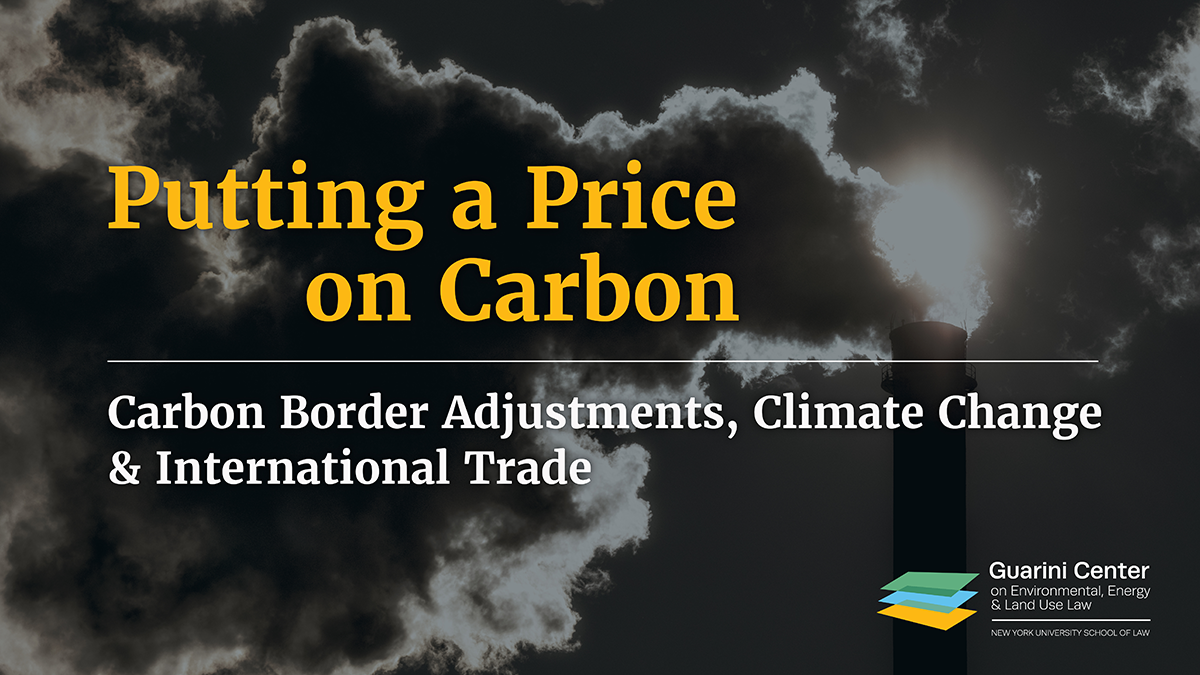
- This event has passed.
Putting a Price on Carbon: Carbon Border Adjustments, Climate Change & International Trade

In responding to the growing climate crisis, governments across the globe are deploying new and ambitious market-based policies aimed at driving down greenhouse gas emissions. A prime example is the European Union’s Carbon Border Adjustment Mechanism (CBAM), which began to take effect in fall 2023. It will price the carbon emissions of certain carbon-intensive imports into the EU, such as cement, steel, and some electricity, if the producing country does not have climate policies equivalent to the EU’s. CBAM aims to level the playing field for products produced in the EU, which already face a carbon price, and to prevent carbon leakage.
While CBAM could spur countries outside the EU to adopt more robust climate policies, it also might disadvantage industries in the Global South that export to the EU and prompt protectionist responses from others, which would harm international trade. There also are questions about whether CBAM is consistent with international trade rules. At this panel event, experts in trade, climate, and international economic law discuss CBAM’s implications for the United States and other countries, and the challenge of achieving a balance between climate action and international trade.
PANELISTS
Dr. Inu Manak, Fellow for Trade Policy, Council on Foreign Relations
Inu Manak is a fellow for trade policy at the Council on Foreign Relations (CFR). At CFR, she researches and writes on policy issues relevant to U.S. trade policy, including topics such trade politics and institutions, trade negotiations, and dispute settlement. An expert in international political economy, Dr. Manak’s research focuses on U.S. trade policy and the law and politics of the World Trade Organization.
Dr. Jesse Scott, Visiting Research Fellow, German Economic Research Institute DIW Berlin; Adjunct, Hertie School
Jesse Scott is an expert and global practitioner in strategy, policymaking, and stakeholder engagement on climate change and the clean and just energy transition. She has worked with international and national governments, business, philanthropy, and civil society non-profits. Her technical expertise, international experience, and networks encompass policy and convening across the OECD and the Global South.
Robert Howse, Lloyd C. Nelson Professor of International Law, NYU School of Law
Rob Howse teaches international economic law and legal and political philosophy at NYU. He was principal trade expert for the Renewable Energy and International Law Project, a consortium of Yale University, Climate Change Capital, & Baker McKenzie. He is the author or co-author of numerous studies & articles on climate change, renewable energy and international economic law. He has consulted on these issues to law firms, international intergovernmental organizations as well as NGOs.
MODERATOR
Katrina Wyman, Faculty Director, Guarini Center; Wilf Family Professor of Property Law, NYU School of Law
CLE
This event has been approved for one New York State CLE credit in the category of Areas of Professional Practice. The credit is both transitional and non-transitional; it is appropriate for both experienced and newly admitted attorneys.
OUT-OF-STATE CLE
NYU School of Law is an accredited provider of CLE in New York State. If you are seeking CLE credit for a different state, we recommend you consult with your state’s CLE Board to ascertain regulations on reciprocity.